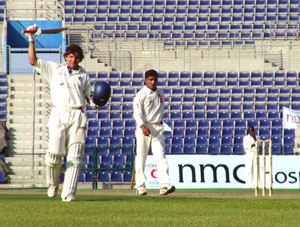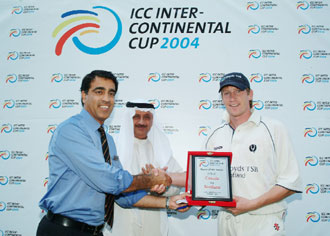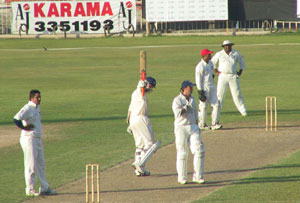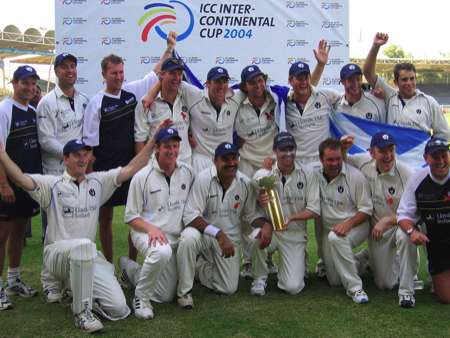
2004 saw the launch of the Intercontinental Cup, and over the next 13 years there would be seven editions of the first-class tournament featuring 17 countries, 152 matches and 667 players.
The tournament was the brainchild of ICC High Performance Manager Bob Woolmer who devised the competition to expose countries to the longer format of the game, and attempt to narrow the gap between participants and Full Member nations.
The first edition saw 12 teams compete, split into four groups on a geographical basis.
- Europe: The Netherlands, Scotland and Ireland.
- Americas: USA, Canada, Bermuda.
- Africa: Kenya, Namibia, Uganda.
- Asia: UAE, Nepal and Malaysia.
The format saw each team playing each other once over three days with bonus points based on the English county system, and the group winners progressing to semi-finals in the UAE.
The first match on March 25th saw UAE taking on Nepal in Sharjah and it got off to a dramatic start with Mahaboob Alam bowling Asim Saeed with the second ball of the game. Alam would claim a historic place in the World Cricket league four years later by claiming all ten Mozambique wickets for Nepal – a feat which saw a stand named after him.
UAE recovered as Arshad Ali scored the first century of the competition with a brilliant 143, and with the ever consistent Khurram Khan making 75, the Emiratis posted 293 – five wickets for Binod Das.
Ali Asad Abbas then produced a quite brilliant bowling display – his 9 for 74 the best figures in the tournament history and ensuring the UAE got the better of the bonus points drawn match – 18 to 14.
Nepal briefly went on top of the group as they proved too strong for Malaysia in a nine-wicket win based around a fine 69 by Shakti Gauchan and a fine all-round bowling display.
That meant UAE had to beat Malaysia in Kuala Lumpur to seal a semi-final berth, and they did that by 124-runs thanks to the bowling heroics of Mohammed Tauqir who took 4 for 34 and 6 for 17 to have match figures of 10 for 51. Arshad Ali and Khurram Khan again among the runs.
The Americas group started in May and John Davison of Canada – then the holder of the fastest World Cup century – showcased his all-round abilities by almost overhauling Ali Asad's figures, taking 9 for 76 as the oldest rivalry in World Cricket was renewed between Canada and the USA – the first match going back to September 1844!
Davison also took a further eight wickets in the second innings to finish with match figures of 17 for 137 – never to be bettered in subsequent years – as Canada claimed bragging rights in the North American derby. Davison's haul was the best first-class figures since Jim Laker's 1956 Ashes aggregate of 19.
USA bounced back to beat Bermuda by 114 runs, thanks primarily to a century by Steve Massiah and five second innings wickets by 40 year-old Jamaican Howard Johnson. Dwayne 'Sluggo' Leverock took seven wickets for Bermuda in the losing cause.
Canada though ensured they topped the group by getting the better of Bermuda in a drawn contest with Davison again to the fore. He took 5 for 19 as Bermuda were dismissed for 107 replying to 250, and then scored 78 as Canada scored 250 again – Haninder Dillon scoring a century. Needing an unlikely 394 for the win, Bermuda hung on for a consolation draw at 221 for 9 – six wickets for Kevin Sandher.
The European region got under way in Aberdeen with Scotland and The Netherlands playing a hard and closely fought game which ended in a draw with just one point separating the sides. Craig Wright (88*) and Cedric English (65) shared a century stand while Bas Zuiderent (78) and Luuk van Troost (71) replied with the same, before Ryan Watson's five wickets saw the Dutch collapse losing seven wickets for 48 to give the hosts a 57-run advantage. Second time around and further fifties by Bruce Patterson and Fraser Watts set the visitors a target of 308.
Tom de Grooth (59) gave them a steady start, and a second century stand for Zuiderent (68*) and Van Troost (46*) saw Holland on 207 for 3 when the game finished.
Next up for the Dutch was a home tie with an Ireland side boosted by several players now calling the Emerald Isle home with the Celtic Tiger in full swing. Trent Johnston took four wickets in the first innings as the hosts made 200. Andy White's love affair with the long format started here as his unbeaten 152 saw the Irish take a lead of 188. His innings impressed umpire Rob Bailey who recommended him to Northants, and a county deal was secured. Shaukat's five wicket haul then ensured an Irish innings win.
Scotland travelled to Clontarf needing a win and with an uncertain weather forecast it seemed Ireland's place in the semi-finals would be assured. However, as Fraser Watts recalled the visitors were given a real boost when the pitch at Castle Avenue was unveiled to reveal a track which was about as dark a shade of green as possible.
"I remember the Irish not being very happy as the groundsman, God bless his heart, produced a green seamer which meant there would be a result," Watts began.
"There were two really strong sides with quality cricketers in both, and produced a really good game which ebbed and flowed throughout."
Asim Butt (4-25) and Craig Wright (3-29) exploited the early conditions but the Irish lower order rallied to get to 193. Naseer Shuakat (5-60) and Johnston (2-19) found the pitch equally to their liking and at the halfway stage, Ireland held a 27-run lead.
 Ireland's Jason Molins is bowled by Asim Butt at Clontarf.
Ireland's Jason Molins is bowled by Asim Butt at Clontarf.
Butt, who sadly died in 2009, again proved unplayable taking five wickets, while Wright accounted for Eoin Morgan cheaply again (0 and 7). Andy White (67) and Trent Johnston (47) shared the only stand of note, but a target of 206 in the last innings of the game was still a stern proposition against a formidable opponent.
Johnston and Andre Botha struck early and at 28 for 2, the Irish seemed in control before Fraser Watts played one of the innings of his career.
"There was rain around and some doubt if the game would be finished, but thankfully myself and Dougie Lockhart shared a great partnership and managed to chase it down.
"That win was really important for us as it gave us tremendous belief and was one of the catalysts for further success."
Watts finished unbeaten on 118 from 136 balls, repelling everything the home attack threw his way, hitting 17 boundaries and clearing the ropes three times to get his side over the line. The third wicket stand with Dougie Lockhart (53*) was an unbroken 178, and as Flower of Scotland was belted out in the Dublin suburbs, they could plan ahead for a semi-final in November.
And what became of the Clontarf groundsman that day? Well, he was none other than Karl McDermott who after a spell at Hampshire is now in charge of the hallowed turf of Lord's.
Kenya were strong favourites for the African group, but it was the two other sides, Uganda and Namibia who would get things underway. Namibia struggled to just 165 and when half centuries from Frank Nsubuga and Nand Kishar gave Uganda a 105-run first innings advantage, there was the potential for a real shock. Namibia rallied to 289 with Kenneth Kamyuka – who would later defect and play for Canada – taking five wickets. Still a chase of 185 was not without danger on a wearing pitch, but Uganda prevailed thanks to a fourth wicket stand of 136 between Benjamin Musoke (72) and Nsubuga (41).
Kenya, fresh from a World Cup semi-final berth the year before, proved an altogether different proposition with Uganda sliding to an innings loss. Ravi Shah (135) and Hitesh Modi (85) sharing a 187-run partnership.
Namibia gave Kenya a scare in the final game as a fine batting display saw them post 357 for 6, while they then reduced them to 67 for 5. Kenya however rallied, and with Modi hitting 32 fours in an unbeaten second innings score of 187, they got the draw they needed to reach the semi-finals.
November saw the semi-finals taking place simultaneously but it was a severely depleted Kenyan side which played Scotland. A players strike over contracts saw nine of their regulars missing, including Steve Tikolo and Thomas Odoyo.
 Fraser Watts acknowledges his century against Kenya (© Ken McCurdie)
Fraser Watts acknowledges his century against Kenya (© Ken McCurdie)
Scotland took full advantage with Fraser Watts again in the runs, hitting 146 and sharing significant stands of 93 with Dougie Lockhart (42) and 118 with Ryan Watson (57) as they racked up 300. Paul Hoffmann then took 5 for 5 as the Africans were dismissed for just 95. With a lead of 205 Scotland just needed to not lose now and they made certain of that by piling on a total of 401 for 7. A teenage Kyle Coetzer hit 133 not out while there were half centuries for Watson, Colin Smith and Craig Wright. Kenya did secure a draw with an improved second innings batting effort, but Scotland in truth were coasting and saving their energies for the final.
Canada's batters came good as they joined Scotland in the decider. Zubin Zukari's 139 the foundation for their progress, allied to half centuries from Ian Billcliff, Desmond Maxwell and Sunil Dhaniram. Syed Ahmed did get a century for UAE, who hung on for the consolation of a draw despite five wickets for Umar Bhatti.
In the way of the Associate world where money is too tight to mention, the teams had just one day to recover before facing off in the final at Sharjah. Canada were without their talisman John Davison, playing in Australia, but they did make a good start by winning the toss on a Sharjah track which was normally a paradise for batsmen.
 John Blain was Man of the Match in the Final (© Ken McCurdie)
John Blain was Man of the Match in the Final (© Ken McCurdie)
Scotland opening bowler John Blain recounts the final, with the details clearly etched in his brain despite the passage of time.
"It was a typically hot day and we lost the toss. We knew a bit about them having played fairly regularly against them, with a few dangerous batters in Maxwell and Billcliff, while Bhatti with the new ball could be a handful."However we had the confidence of knowing that we had assembled as good a side as we ever had. We had guys with specialist skills right through and we were so well balanced as a unit. We had guys who could score big runs in the top five or six, a really strong seam attack as well as some good spin options so we had all bases covered.
"We bowled them out for 110 in just over 40 overs, with myself and Ryan Watson getting three each, Asim Butt and Paul Hoffmann got two apiece with Craig Wright getting the other. A great effort on a batters deck and from then on we were always in control.
 Douglas Lockhart reaches his fifty against Canada (© Ken McCurdie)
Douglas Lockhart reaches his fifty against Canada (© Ken McCurdie)
"Dougie Lockhart (64) got runs and he and Gavin Hamilton (115) put on a century stand. Gavin's hundred was an exceptional effort given the heat and humidity. Ryan then got a good fifty to follow up his wickets and it was a bit of a changing room joke that he didn't get the Man of the Match award."
Scotland's first innings lead was 177, but any hopes of Canada launching a fightback were quickly extinguished in an astonishing new ball burst by Blain and Asim Butt.
"The second innings was what I can only describe as one of the best bowling displays by a Scotland team," said Blain.
"Asim got it to swing and the pitch had hardened for me, so I managed to get it through at a reasonable pace. We got four wickets apiece and they were bowled out for next to nothing as we won by an innings and 84 runs. It was hostile, the ball swung and they had no answer to what was a superb effort by the bowling unit.
"It was really the culmination of a lot of good work leading into the final. We were really deserved winners and it was a really powerful display. It was certainly one of the most memorable days of my career. I'm reminded of it constantly because I still have the plaque I got for the MOM as it sits in my office"
Although Watts didn't score too many in the final, he has fond memories of the first silverware won by Scotland.
 The Scotland squad celebrate winning the trophy (© Ken McCurdie)
The Scotland squad celebrate winning the trophy (© Ken McCurdie)
"It was an amazing team to be part of. One of those sides where everyone got on and there were no cliques. Really honest, genuine team with so many talented players throughout the entire squad with no weak links.
"The bowling attack could perform in all conditions and the batsmen were all capable no matter what the situation. It was as strong a group as Scotland ever had. You go through the scorecards and it reads like a who's who of Scottish cricket with so many greats.
"What's more is that we were all really good friends too. We used to be in hotels on the same floor and we would all leave the doors open. We were really comfortable together and it showed with team unity on the pitch too.
"We had a great coach in Tony Judd, and then later in Andy Moles and Peter Drinnen. We all wanted to win for each other and that showed. They were great times and I've some great memories from what was certainly a halcyon period for Scottish cricket."
Scotland went on to win the ICC Trophy in 2005 but this was to be their last success in the first-class competition as Ireland and Afghanistan emerged as the Associate powerhouses.
